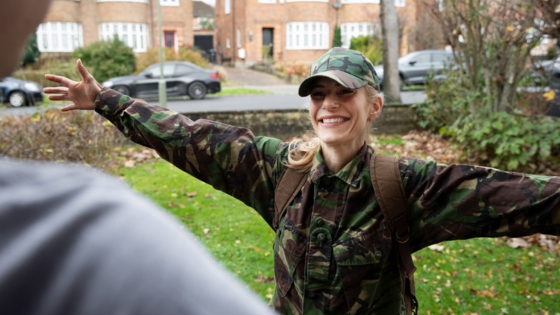Transitioning from a military to a civilian lifestyle marks a significant phase in the lives of veterans. It’s a journey that involves adapting to new norms, redefining personal identities, and integrating into a society that operates on different rhythms and values. While the military environment is structured with clear hierarchies and codes of conduct, civilian life offers a different kind of freedom and challenge.
This transition can be complex and multifaceted, requiring careful navigation and support. This article explores 10 essential tips to help veterans make this important transition as smooth as possible. From leveraging military skills for civilian employment to understanding the importance of mental health, these insights aim to empower veterans to successfully embark on their new chapter in life.
Transitioning From a Military to a Civilian Lifestyle: 10 Tips To Guide You
 1. Acknowledge the Transition
1. Acknowledge the Transition
The first step in a successful transition is acknowledging the change. Leaving the military environment and entering civilian life is not merely a career change; it’s a lifestyle transformation.
Veterans should give themselves permission to recognize this significant life event and understand that adjustments, both emotionally and physically, are part of the process. Embrace this period as a time of growth and learning, and be patient with yourself as you navigate these changes.
2. Seek Support and Resources
One key resource for veterans is Mesothelioma Hope, which offers guidance and support for veterans dealing with health issues, such as mesothelioma, a condition that disproportionately affects military veterans due to asbestos exposure in military equipment and facilities.
Beyond health-related support, tapping into veteran organizations and career transition programs can provide invaluable assistance. These organizations understand the unique challenges of transitioning to civilian life and offer resources, mentorship, and networking opportunities that can pave the way for a smoother transition.
3. Translate Military Skills to Civilian Job Markets
Veterans possess a wealth of skills and experiences that are highly valuable in the civilian job market. Leadership, teamwork, discipline, and problem-solving are just a few examples of military strengths that can set you apart in your civilian career. The challenge lies in translating these skills into terms that resonate with civilian employers. Utilize transition assistance programs and career workshops to learn how to effectively communicate your military experience in a way that highlights your capabilities and potential contributions to civilian roles.

4. Embrace Lifelong Learning
The transition to civilian life is an excellent opportunity to embrace lifelong learning. Whether it’s pursuing higher education, acquiring new vocational skills, or simply learning about civilian workplace culture, continuing your education can enhance your adaptability and competitiveness in the job market. Many veterans benefit from using the GI Bill to cover educational expenses, allowing them to explore new career paths that were not accessible or available during their military service.
5. Build a New Network
Creating a new network is crucial in transitioning to civilian life. While the camaraderie of the military is unique, developing connections within your new community can provide support, friendship, and professional opportunities. Start by connecting with fellow veterans who have successfully transitioned, as they can offer advice, share their experiences, and introduce you to other contacts.
Attend community events, join professional associations related to your field of interest, and leverage social media platforms to expand your network. Remember, networking is not just about finding job opportunities; it’s about building relationships that can enrich your personal and professional life in many ways.
6. Manage Your Finances Wisely
Transitioning to civilian life often comes with financial changes. Without the military’s steady paycheck and benefits, managing your finances becomes a crucial skill. Create a budget that reflects your current income and expenses, and educate yourself on financial planning and investment. Many organizations offer financial counseling specifically designed for veterans, helping you make the most of your benefits and savings.
7. Prioritize Your Health and Well-being
The stress of transitioning can take a toll on your physical and mental health. It’s essential to prioritize your well-being by staying active, eating healthy, and seeking support when needed. Mental health, in particular, is an area that many veterans find challenging. Don’t hesitate to reach out to veteran support groups or professional counselors who understand the unique experiences of military personnel. Remember, seeking help is a sign of strength and an important step in your transition.
8. Explore New Interests and Hobbies

Military life may not have left much room for personal hobbies or interests. Use this new chapter to explore activities you’ve always wanted to try or passions you had to put on hold. Engaging in hobbies can be a great way to relieve stress, meet new people, and discover potential career paths or entrepreneurial opportunities. Whether it’s outdoor adventures, creative arts, or volunteering, immersing yourself in new experiences can enrich your life and help you feel more connected to your community.
9. Set Realistic Goals and Expectations
Setting realistic goals and expectations for your transition can help you navigate the change more smoothly. Understand that it’s okay not to have everything figured out right away. Set short-term and long-term goals for your career, education, and personal life, and be flexible in adjusting them as you learn and grow in your new environment. Celebrating small victories along the way can also provide a sense of accomplishment and motivation to keep moving forward.
10. Be Patient and Give Yourself Time
Finally, give yourself time to adjust. Transitioning from a military to a civilian lifestyle is a significant change that doesn’t happen overnight. It’s a journey of self-discovery, learning, and growth. Be patient with yourself and understand that it’s normal to experience ups and downs. With time, persistence, and support, you can successfully navigate this transition and build a fulfilling civilian life.
Conclusion
Transitioning from military to civilian life is a journey filled with challenges, opportunities, and personal growth. By acknowledging the transition, seeking support, and utilizing the tips outlined in this article, veterans can navigate their way to a successful civilian life. Remember, the skills, discipline, and values you’ve gained in the military are assets that can contribute significantly to your new community and career. Embrace the journey, stay open to new experiences, and know that you’re not alone in this transition. With the right approach and mindset, you can turn this period of change into a rewarding new chapter in your life.
 About the Author
About the Author
Lana Hawkins is a stay-at-home mum by day and author by night. She is passionate about traveling, cooking and home decor.


